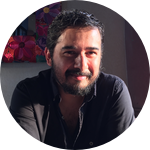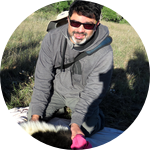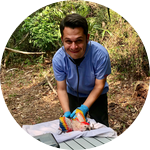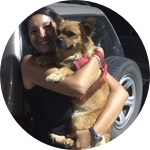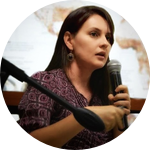About This Project
The Maya Biosphere Reserve is one of Mesoamerica's most important wildlife conservation areas. Humans and wildlife have coexisted here for many years, but domestic animal populations in the reserve communities are increasing, which may increase spillover risk of common diseases such as distemper and parvovirus. We will be evaluating the transmission of pathogens between domestic species and wildlife to better understand the risk of these diseases to wild carnivores.
Ask the Scientists
Join The DiscussionWhat is the context of this research?
The jaguar is classified as near threatened worldwide.This species is also considered threatened by the Guatemalan government. In recent years, the species has seen its range reduced by 50% due to habitat loss and conflicts with people.In the Maya Biosphere Reserve dogs often accompany humans as an essential companion in their daily activities.This area has very limited veterinary services, yet there is significant risk of disease transmission between domestic animals and wild carnivore populations.However, there is a lack of information regarding prevalent diseases in this area, including distemper and parvovirus, that may threaten wild carnivores. This study will strengthen current conservation efforts led by WCS Guatemala, including initiatives to coexist with carnivores in the region.
What is the significance of this project?
In the last few years, the Wildlife Conservation Society Guatemala has conducted biological monitoring through camera traps in the buffer zone of the Maya Biosphere Reserve. These camera traps were intended to study populations of jaguars and their prey, but also showed a considerable number of dogs entering the reserve -- alone or accompanying their owners. Dogs may represent a threat to the health of wildlife, as we know almost nothing about the movement of dogs within the forest. Therefore, we will be sampling dogs and other wild carnivores for evidence of disease transmission in order to understand how their movements and possible interactions can affect wild carnivores, especially jaguars.
What are the goals of the project?
This project will identify anthropogenic factors that may influence transmission of infectious diseases between domestic animals and wildlife, specifically as it relates to dogs and wild carnivores.
We will collect 100 blood and fecal samples from village dogs and at least 100 fecal samples from wild carnivores. These samples will be tested serologically and molecularly (PCR) to identify the presence of distemper and parvovirus. We will then compare DNA sequences of viral strains in order to find similarity. This will allow us to to infer if they are related, and to determine if these strains are being shared by dogs and wild carnivores.
Budget
Budget will be used for fieldwork (lodging, capture and sampling), purchase of reagents for laboratory analysis (DNA and RNA extractions) and to develop an awareness strategy with key community members, such as women and local stakeholders. We will collect biological samples (blood, nasal and anal swabs) in dogs and non-invasive samples (feces) of wild carnivores for CDV and CPV molecular detection. We will also strengthen knowledge and sensitize the indigenous community towards a coexistence vision, providing a vision of the risks of interaction between domestic dogs and wild carnivores in the Maya Biosphere Reserve.
The approximate cost for the analysis of the samples is $18 per sample for CSD of which $8 will be covered by this crowdfunding and for PV is $16 of which $6 will be covered by the funds obtained from the crowfunding.
Endorsed by
 Project Timeline
Project Timeline
Project duration is one year, with two dogs and wild carnivores sampling periods: rainy season (Nov 2020), and dry season (Feb 2021). Lab detection of infectious agents will be from Mar to Jun 2021, respectively, to complete data analysis (May to Jul 2021) and creating support materials for empowerment campaigns with women (between Jul and Aug 2021) .
Aug 31, 2020
Project Launched
Oct 03, 2020
Travel to the Maya Biosphere Reserve
Oct 05, 2020
Presenting the project to the community
Nov 02, 2020
Start non invasive wild carnivores sampling (fecal colletion)
Nov 06, 2020
First season of dogs sampling (blood)
Meet the Team
Affiliates
Affiliates
Team Bio
WCS Guatemala and AWÁ Science & Conservation, are non-profit associations who works in research, education and social action in disease ecology, conservation and related topics in Mesoamerica. Our intention is to study of infectious diseases in neotropical wildlife, with an ecological analysis from an interdisciplinary approach to generate data that favor the conservation of Neotropical environments.
Luis Fernando Guerra
I'm a veterinarian, with a master's degree in wildlife conservation and management from the Institute of Wildlife Conservation and Management (ICOMVIS) at the National University of Costa Rica (UNA). I'm currently working at the Wildlife Conservation Society-Guatemala, as coordinator of the Wildlife Health Program for Mesoamerica, supporting projects for the monitoring and conservation of scarlet macaws and the coexistence between humans and carnivores in the Maya Biosphere Reserve in Guatemala. In recent years, my interest is to develop research on Disease Ecology and its relationship with conservation within protected areas in Petén, Guatemala. I would like to increase the participation of Latin American professionals and students in disease ecology research, especially in Central America.
Paloma Alcázar
I’m a peruvian wildlife veterinarian passionate for nature, and for the understanding of the human relationships with it. Following the dream of being a veterinarian and using my career and skills for working towards wildlife conservation.
I have followed studies on Conservation Medicine and Wild animal health, and participate on several research and conservation projects to better understand and generate information that supports the conservation of threatened wildlife species. Co-Founder and Vicepresident of Awá Science & Conservation, Member of BAWI - One Health & Coexistence, and director of the Proyecto Huangana, a research focused on the study of agents with the potential to threaten local communities and white lipped-peccary populations at the human-wildlife interface at the Peruvian Amazon.
Working with conservation projects has gave me the opportunity to learn from people of local communities about the values and traditions that outline their relationships with the environment, and understand the importance of the human dimensions on wildlife conservation. In Awá, I’m interested in studying the effects of anthropogenic activities on the health of wildlife populations; the development of strategies for the prevention of disease transmission on the human-wildlife interface, and outline projects that promote the coexistence of people and wildlife on healthy communities.
Rony García-Anleu
I have been working on the Maya Biosphere Reserve for WCS since 2002, and my interest are biological monitoring and management of medium and large vertebrates. I am pasionate for dogs and technology focused on wildlife research.
Andrea Chaves
My investigations are focused on wildlife diseases and disease ecology, combining molecular, social and environmental analysis to understand the dynamics of infectious agents in animal wildlife. I have developed my research in various taxa, and with a broad spectrum of infectious agents (viruses, bacteria, parasites) primarily from environments in the wild of Latin America - Mexico, Guatemala, El Salvador, and Costa Rica. These have provided the opportunity to develop critical questions with appropriate and diverse models of organisms and systems. The unifying theme of my research is to understand the general variables favoring the presence of infectious diseases, in diverse communities across multiple spatial scales affected by anthropogenic activities. I am president and founding partner of the AWA Science & Conservation Association for Costa Rica, which now has been active for over three years. I founded this organization together with other Costa Rican researchers. Through this non-profit, I fulfill part of my personal commitment to contribute my skills to the training of young people with interest in conservation and disease ecology, and develop programs that integrate society and science to solve challenges for the mesoamerican region.
Additional Information
Additionally, we seek to empower the community through women who already have a significant role on the socio economic wellbeing within the community.
We will promote the stregthening of Latin American research networks. For the current project blood and fecal samples will be analyzed under collaboration with different local and regional institutions and laboratory partners.
Project Backers
- 24Backers
- 25%Funded
- $804Total Donations
- $33.50Average Donation
